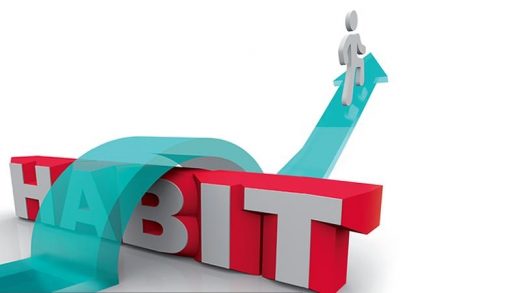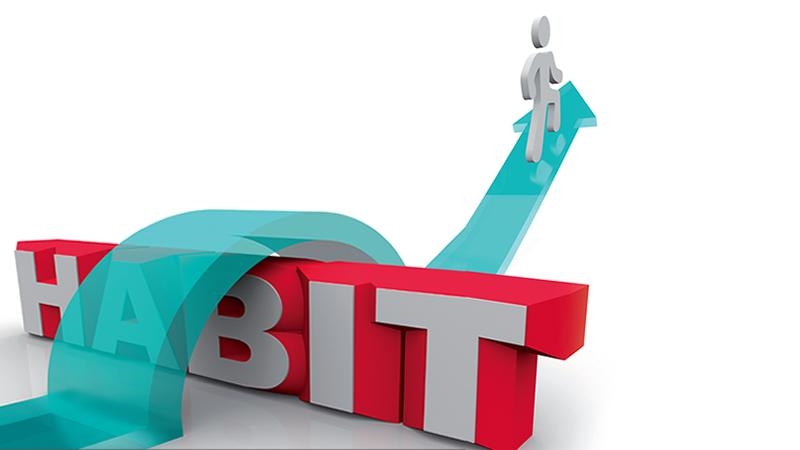The Habits
The Habits
Have you ever paid attention to how you walk? Unless you’re a runway model, chances are – probably not. You stand up and your body somehow knows how make the right movements, accounts for gravity, objects around you and your balance and left and right you go. Your body is on autopilot. Now imagine deliberately thinking about every step. Lifting your leg up, consciously looking at the floor beneath you, trying to keep a straight back – pausing – and repeating the same movement for your other leg. This is the difference between willpower and habits. Whereas willpower requires deliberate thought from our rider, habits are carried out on auto-pilot by our elephant. If willpower is a stick, then habits are clearly marked paths for our elephant. It’s easy to walk down them because our elephant knows the way.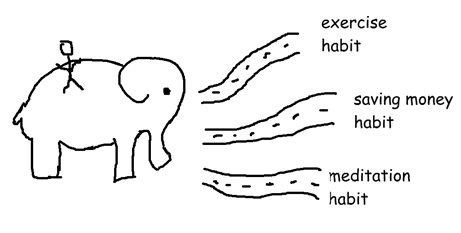 And here is the good news, the more you walk down a path, the easier it gets. At first it might have seemed like a chore to brush your teeth every night or wash your hands after using the bathroom. But over time this became second nature. Research* shows that we can form habits as quickly as 2-3 weeks; the more difficult the habit, the more time it takes to form. But once a habit is formed, our elephant takes the lead and our rider can take some much needed z’s.
And here is the good news, the more you walk down a path, the easier it gets. At first it might have seemed like a chore to brush your teeth every night or wash your hands after using the bathroom. But over time this became second nature. Research* shows that we can form habits as quickly as 2-3 weeks; the more difficult the habit, the more time it takes to form. But once a habit is formed, our elephant takes the lead and our rider can take some much needed z’s. 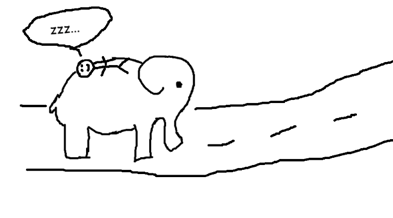
How to form habits
For about a year I struggled to make my exercise habits stick. I found it a chore to wake up early and was tired after work so I never got around to it. I always had an excuse for not working out: “I’m tired today”, “I have too many things on”, “It’s Friday, give me a break” That was until I came across a book called The Power of Habits by Charles Duhigg. The book made it perfectly clear to me why I couldn’t stick to my exercise habit. This is how it broke down the components of any habit:
- Reminder (cue) – the trigger that initiates the behavior
- Routine – the behavior itself; the action you take
- Reward – the benefit you gain from doing the behavior
All I had so far was the exercise routine, not the reminder or reward. I started with setting a reminder. I found phone reminders naggy and annoying. That didn’t work. Instead I looked at my day and wrote down actions I took without fail that I could use as reminders: waking up, brushing teeth, eating, getting dressed and so on… The reminder that was the most powerful for me was hunger. I found if I got really hungry I would be motivated to work out (or do anything) just so I can eat. I liked food too much. More than the pain of an intense workout. And thanks to this new discovery my new habit started to stick. I started consistently exercising every other day. I had all the components of a habit: reminder (hunger), routine (workout) and reward (food). 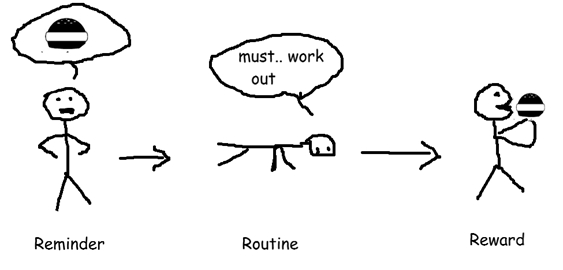 All was well and good…. except it wasn’t. It turns out I couldn’t completely rely on hunger to motivate me. Every molecule of my body craved food. I got hangry: a dangerous combination of hunger and anger. I lost all my inhibitions. My willpower and habit both went out the window. My elephant was in full control and he just wanted to eat.
All was well and good…. except it wasn’t. It turns out I couldn’t completely rely on hunger to motivate me. Every molecule of my body craved food. I got hangry: a dangerous combination of hunger and anger. I lost all my inhibitions. My willpower and habit both went out the window. My elephant was in full control and he just wanted to eat. 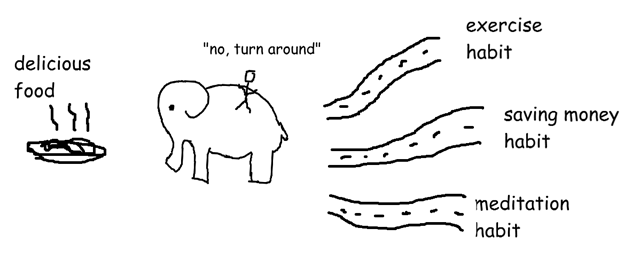 This disappointed me at first. How could I not control my hunger and give in so easily? Am I going to break all my habits like this? Was there something wrong with me? And then I discovered yes there was something wrong with me; I was human. A bag of meat and bones, full of imperfections, complex emotions and conflicting desires. Part of an intelligent species of other humans who share this common trait with me: fallibility. The first couple of times I caved in to my hunger, I beat myself over it and felt disappointed with my newly formed habit. However these feelings didn’t help me at all. Instead what helped me get up and try again the next day was self-compassion. Acknowledging that I’m going to mess up and not honour my word sometimes and that I’m not the only human struggling with this problem. Every day millions of people start new diets and exercise programs and everyday millions of people fail.
This disappointed me at first. How could I not control my hunger and give in so easily? Am I going to break all my habits like this? Was there something wrong with me? And then I discovered yes there was something wrong with me; I was human. A bag of meat and bones, full of imperfections, complex emotions and conflicting desires. Part of an intelligent species of other humans who share this common trait with me: fallibility. The first couple of times I caved in to my hunger, I beat myself over it and felt disappointed with my newly formed habit. However these feelings didn’t help me at all. Instead what helped me get up and try again the next day was self-compassion. Acknowledging that I’m going to mess up and not honour my word sometimes and that I’m not the only human struggling with this problem. Every day millions of people start new diets and exercise programs and everyday millions of people fail.  As I continued to fight my self-criticism with with self-compassion I learnt a far more important lesson…
As I continued to fight my self-criticism with with self-compassion I learnt a far more important lesson…
Power of baby steps
Imagine if a wizard gives you a magic wand that can improve any aspect of your life by 0.1%. Abracadabra. 0.1% more money in your bank account Abracadabra. 0.1% improvement to your health Abracadabra. 0.1% more knowledge about the world 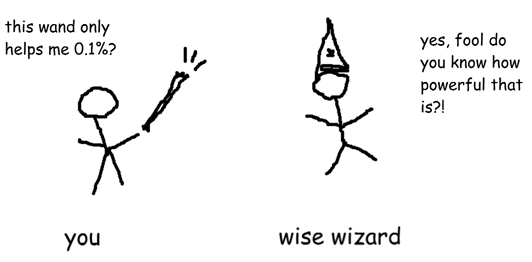 At first, it doesn’t look like a very useful magic wand, you might want to give it back to the lazy wizard who gave it to you. Most people might not even bother to use it. But what if you could use the wand once a day for as long as you liked? Would you use it then? Maybe you might pick it up, play around with it for a couple of days or weeks to see if you notice an impact. Strange, you think to yourself. I’ve used this damn wand for a whole month. Why am I not buffed yet? Where is my six pack?
At first, it doesn’t look like a very useful magic wand, you might want to give it back to the lazy wizard who gave it to you. Most people might not even bother to use it. But what if you could use the wand once a day for as long as you liked? Would you use it then? Maybe you might pick it up, play around with it for a couple of days or weeks to see if you notice an impact. Strange, you think to yourself. I’ve used this damn wand for a whole month. Why am I not buffed yet? Where is my six pack? 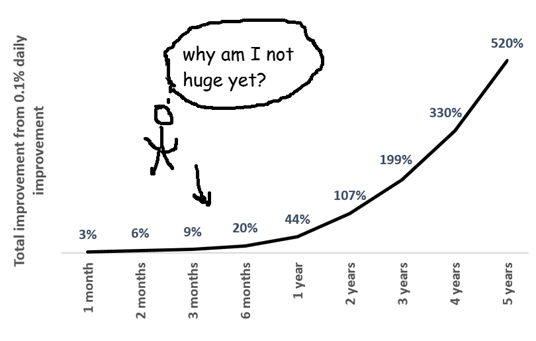 And this is exactly why 80% of gym memberships are canceled within the first few months. People sign up excited about losing weight normally at the start of the year but after a few weeks they give up because they don’t see any results. Just like the magic wand, they don’t see the invisible 0.1% improvements to their health from each visit to the gym. But in reality it is exactly these 0.1% baby steps over time that make all the difference. If you kept going just a bit longer, a year of 0.1% improvements everyday will result in a 44% total betterment of any field of your choosing. Two years, 107% improvement. And in 5 years, a massive 520% improvement. This is the compound power of habits. Tiny actions over time can lead to massive results. This lesson alone made all the difference for me. Excerpt from Ari Yeganeh Article on
And this is exactly why 80% of gym memberships are canceled within the first few months. People sign up excited about losing weight normally at the start of the year but after a few weeks they give up because they don’t see any results. Just like the magic wand, they don’t see the invisible 0.1% improvements to their health from each visit to the gym. But in reality it is exactly these 0.1% baby steps over time that make all the difference. If you kept going just a bit longer, a year of 0.1% improvements everyday will result in a 44% total betterment of any field of your choosing. Two years, 107% improvement. And in 5 years, a massive 520% improvement. This is the compound power of habits. Tiny actions over time can lead to massive results. This lesson alone made all the difference for me. Excerpt from Ari Yeganeh Article on The Habits Read Full Article on The Habits Ari Yeganeh

6+ years experience in analytics working with some of the largest brands in Australia using data to drive innovation and growth both as an analyst and consultant.
Ari Yeganeh believe the biggest problem in data analytics/science is not a lack of technical know-how; rather a lack of commercial acumen and people skills.
(28)

